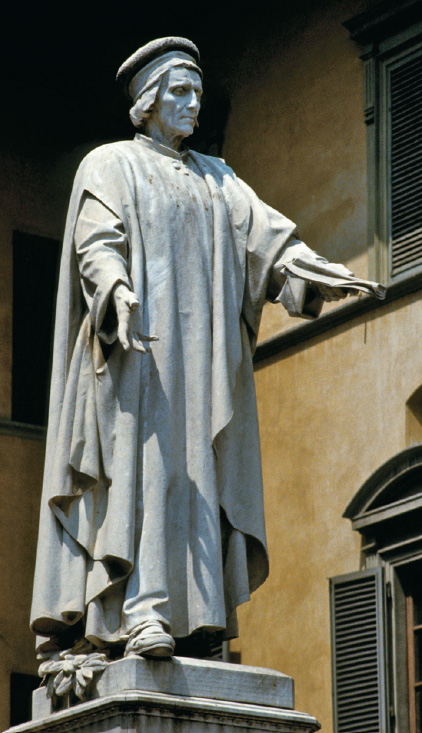A History of Western Society: Printed Page 306
A History of Western Society, Value Edition: Printed Page 314
INDIVIDUALS IN SOCIETY
Francesco Datini

In 1348, when he was a young teenager, Francesco Datini (1335–1410) lost his father, his mother, a brother, and a sister to the Black Death epidemic that swept through Europe. Leaving his hometown of Prato in northern Italy, he apprenticed himself to merchants in nearby Florence for several years to learn accounting and other business skills. At fifteen, he moved to Avignon (ah-veen-YOHN) in southern France. The popes were at this point living in Avignon instead of Rome, and the city offered many opportunities for an energetic and enterprising young man. Datini first became involved in the weapons trade, which offered steady profits, and then became a merchant of spices, wool and silk cloth, and jewels. He was very successful, and at thirty-one he married the young daughter of another merchant in an elaborate wedding that was the talk of Avignon.
In 1378 the papacy returned to Italy, and Datini soon followed, setting up trading companies in Prato, Pisa, and Florence. He focused on cloth and leather and sought to control the trade in products used for the preparation of these materials as well, especially the rare dyes that created the brilliant colors favored by wealthy noblemen and townspeople. He eventually had offices all over Europe and became one of the richest men of his day, opening a mercantile bank and a company that produced cloth.
Datini was more successful than most businessmen, but what makes him particularly stand out was his record keeping. He kept careful account books and ledgers, all of them headed by the phrase “in the name of God and profit.” He wrote to the managers of each of his offices every week, providing them with careful advice and blunt criticism: “You cannot see a crow in a bowl of milk.” Taking on the son of a friend as an employee, he wrote to the young man: “Do your duty well, and you will acquire honor and profit, and you can count on me as if I were your own father. But if you do not, then do not count on me; it will be as if I had never known you.”
When Datini was away from home, which was often, he wrote to his wife every day, and she sometimes responded in ways that were less deferential than we might expect of a woman who was many years younger. “I think it is not necessary,” she wrote at one point, “to send me a message every Wednesday to say that you will be here on Sunday, for it seems to me that on every Friday you change your mind.”
Datini’s obsessive record keeping lasted beyond his death, for someone saved all of his records — hundreds of ledgers and contracts, eleven thousand business letters, and over a hundred thousand personal letters — in sacks in his opulent house in Prato, where they were found in the nineteenth century. They provide a detailed picture of medieval business practices and also reveal much about Datini as a person. Ambitious, calculating, luxury loving, and a workaholic, Datini seems similar to a modern CEO. Like many of today’s self-made billionaires, at the end of his life Datini began to think a bit more about God and less about profit. In his will, he set up a foundation for the poor in Prato and a home for orphans in Florence, both of which are still in operation. In 1967 scholars established an institute for economic history in Prato, naming it in Datini’s honor; the institute now manages the collection of Datini’s documents and gathers other relevant materials in its archives.
Source: Iris Origo, The Merchant of Prato: Francesco di Marco Datini, 1335–1410 (New York: Alfred A. Knopf, Inc., 1957).
QUESTIONS FOR ANALYSIS
Question
How would you evaluate Datini’s motto, “In the name of God and profit”? Is it an honest statement of his aims, a hypocritical justification of greed, a blend of both, or something else?
Question
Changes in business procedures in the Middle Ages have been described as a “commercial revolution.” Do Datini’s business ventures support this assessment? How?